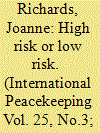| Srl | Item |
| 1 |
ID:
135280


|
|
|
|
|
| Summary/Abstract |
Why do non-state armed groups forcibly recruit civilians? To address this question I develop a conceptual framework distinguishing voluntary, coerced and forced recruitment. I then compare the recruitment tactics employed by ‘Mai-Mai’ militias and the RCD-Goma rebel group in the Democratic Republic of Congo (DRC) in order to inductively develop a theory explaining why groups with different initial economic and social endowments resort to force. This comparison draws on interviews with 41 former militia members and 11 former members of RCD-Goma. The theory suggests that forced recruitment is most likely to occur when non-state armed groups experience manpower deficits and when accountability (to local communities, government sponsors and/or the international community) is low. High levels of popular support will not necessarily prevent recourse to force under these conditions, but may mean that force is less necessary because voluntary and coerced recruits come forward to fill manpower gaps.
|
|
|
|
|
|
|
|
|
|
|
|
|
|
|
|
| 2 |
ID:
159143


|
|
|
|
|
| Summary/Abstract |
Programmes of disarmament, demobilization, and reintegration (DDR) are increasingly implemented in contexts of violent extremist conflict. In such settings, DDR practitioners may need to distinguish between ex-combatants who can be safely reintegrated into civilian life, and ex-combatants who are likely to present a danger to the community in terms of violent and/or extremist re-offending. To help practitioners make this assessment, this paper explores how risk assessment tools used by psychologists in criminal justice settings may be adapted to screen for violent extremist offenders in DDR programmes. The findings suggest that the method of structured professional judgment (SPJ) can be used to assess the risk that individual ex-combatants will re-offend upon return to civilian life. By extension, SPJ can also: (1) help practitioners to understand what type of deradicalization and disengagement programming former members of extremist groups may require and (2) contribute to decisions concerning the release of ex-combatants from prisons and transitional DDR centres.
|
|
|
|
|
|
|
|
|
|
|
|
|
|
|
|
| 3 |
ID:
157850


|
|
|
|
|
| Summary/Abstract |
This article investigates the link between the organizational structure of nonstate armed groups and the ability of low-level combatants to desert without recapture. Throughout, I show that nonstate armed groups can adopt organizational structures that mimic those found in national armies and that are designed both to detect wannabe deserters and to facilitate the denunciation and recapture of those who manage to escape. The odds of a successful desertion are increased when territorial safe havens beyond the reach of these organizational structures are available. Three types of territorial safe haven are identified: (1) territory composed of rough terrain and/or free of nonstate armed groups and their informants; (2) United Nations (UN) bases and cantonment sites; and (3) other state and nonstate armed groups willing to accept deserters. These arguments are inductively developed from interviews with more than one hundred former members of nonstate armed groups in the Democratic Republic of Congo (DRC).
|
|
|
|
|
|
|
|
|
|
|
|
|
|
|
|